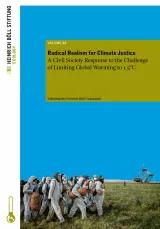Radikaler Realismus für Klimagerechtigkeit
Archiviert | Inhalt wird nicht mehr aktualisiert
Die Begrenzung des Klimawandels auf 1.5 Grad ist möglich und machbar. Diese Publikation ist eine zivilgesellschaftliche Antwort auf die Frage, wie das gehen kann: Mit einer radikalen Abkehr von unseren ressourcenintensiven und verschwenderischen Produktions- und Konsummustern und einer demokratischen Restrukturierung zentraler Sektoren, mit der umfassenden, aber vorsichtigen Wiederherstellung und Renaturierung unserer globalen Ökosysteme, mit dem Schutz von Menschenrechten, Landrechten und den Rechten Indigener Gemeinschaften.
Wenn wir uns auf die dafür notwendige sozial-ökologische Transformation einlassen und sie aktiv gestalten, kann dabei ein gutes Leben für alle ermöglicht sowie gleichzeitig Biodiversität, Ökosysteme und das Klima geschützt werden. 1.5 Grad ist gleichzeitig unsere Chance, Klimagerechtigkeit zu erreichen.
Die Publikation bringt das Wissen, die Erfahrung und Expertise von einer Reihe von internationalen Organisationen, Netzwerken und Wissenschaftler/-innen zusammen, die in ihren politischen Forderungen, ihrer politischen Praxis und wissenschaftlichen Forschung diese transformativen Pfade entwickelt haben.
Produktdetails
Inhaltsverzeichnis
Volume 44.1 A Managed Decline of Fossil Fuel Production
A Managed Decline of Fossil Fuel Production by Oil Change International shows that the carbon embedded in already producing fossil fuel reserves will take us beyond agreed climate limits. Yet companies and governments continue to invest in and approve vast exploration and expansion of oil, coal and gas. This chapter explores the urgency and opportunity for fossil fuel producers to begin a just and equitable managed decline of fossil fuel production in line with the Paris Agreement goals.
Volume 44.2 Another Energy is Possible
Another Energy is Possible by Sean Sweeney of Trade Unions for Energy Democracy (TUED) argues that the political fight for social ownership and democratic control of energy lies at the heart of the struggle to address climate change. Along with a complete break with investor-focused neoliberal policy, this "two shift solution" will allow us to address some of the major obstacles to reducing energy demand and decarbonizing supply. "Energy democracy" must address the need for system-level transformations that go beyond energy sovereignty and self-determination.
Volume 44.3 Zero Waste Circular Economy A Systemic Game-Changer to Climate Change
Zero Waste Circular Economy: A Systemic Game-Changer to Climate Change by Mariel Vilella of Zero Waste Europe explains and puts numbers to how the transformation of our consumption and production system into a zero waste circular economy provides the potential for emission reductions far beyond what is considered in the waste sector. Ground-breaking experiences in cities and communities around the world are already showing that these solutions can be implemented today, with immediate results.
Volume 44.4 Degrowth - A Sober Vision of Limiting Warming to 1.5° C
Degrowth – A Sober Vision of Limiting Warming to 1.5°C by Mladen Domazet of the Institute for Political Ecology in Zagreb, Croatia, reports from a precarious, but climate-stabilized year 2100 to show how a planet of over 7 billion people found diversification and flourishing at many levels of natural, individual and community existence, and turned away from the tipping points of catastrophic climate change and ecosystem collapse. That world is brought to life by shedding the myths of the pre-degrowth era – the main myth being that limiting global warming to 1.5°C is viable while maintaining economic activities focused on growth.
Volume 44.5 System Change on a Deadline. Organizing Lessons from Canada's Leap Manifesto
System Change on a Deadline. Organizing Lessons from Canada’s Leap Manifesto by Avi Lewis, Katie McKenna and Rajiv Sicora of The Leap recounts how intersectional coalitions can create inspiring, detailed pictures of the world we need, and deploy them to shift the goalposts of what is considered politically possible. They draw on the Leap story to explore how coalition-building can break down traditional “issue silos”, which too often restrict the scope and impact of social justice activism.
Volume 44.6 La Via Campesina in Action for Climate Justice
La Via Campesina in Action for Climate Justice by the international peasants movement La Via Campesina highlights how industrialized agriculture and the corporate food system are at the center of the climate crisis and block pathways to a 1.5°C world. In their contribution, La Via Campesina outline key aspects of system change in agriculture towards peasant agro-ecology and give concrete experiences of organized resistance and alternatives that are already making change happen.
Volume 44.7 Re-Greening the Earth: Protecting the Climate through Ecosystem Restoration
Re-Greening the Earth: Protecting the Climate through Ecosystem Restoration by Christoph Thies of Greenpeace Germany calls to mind that greenhouse gas emissions from agriculture and the destruction of forests and peatlands contribute to global warming and dangerous climate change. His chapter makes the case for ecosystem restoration: Growing forests and recovering peatlands can sequester CO2 from the atmosphere and protect both climate and biodiversity. This can make untested and potentially risky climate technologies unnecessary – if emissions from burning fossil fuels and other greenhouse gas emissions are phased out fast enough.
Volume 44.8 Modelling 1.5 °C-Compliant Mitigation Scenarios Without Carbon Dioxide Removal
In Modelling 1.5°C-Compliant Mitigation Scenarios without Carbon Dioxide Removal, Christian Holz of Carleton University, Ottawa, and the Carbon Equity Reference Project (CERP) reviews recent studies that demonstrate that it is still possible to achieve 1.5°C without relying on speculative and potentially deleterious technologies. This can be done if national climate pledges are increased substantially in all countries immediately, international support for climate action in developing countries is scaled up, and mitigation options not commonly included in mainstream climate models are pursued.
